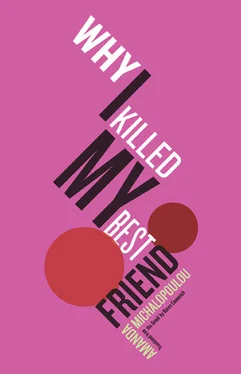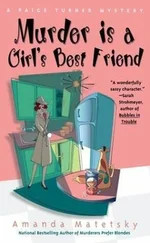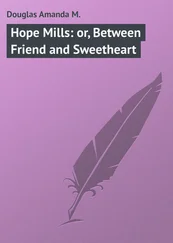“What about school?”
“We don’t learn anything anyhow. Just crap about working women and how to make hats for toilet paper.”
“You’ve got a point.”
Anna looks at me pleadingly.
“Won’t you come?”
“Could I ever let you go alone?”
And yet I do. I say goodbye to her at the airport with burning eyes. Our sweaty fingers slip through one another as we part. Who will I talk to during recess? Smoke with? Pee with? I sob inconsolably in Antigone’s arms at the Hellenic Airport as my best friend’s head vanishes on the other side of passport control.
She’s leaving just for a month or two, on a trial basis. My mother says she’ll cut off my legs if I even think about leaving, she’ll have Interpol on my tail. It’s a threat she invented when I ran off for Ikeja. I imagine the agents bringing me back home in handcuffs; all the newspapers print my photograph, as if I’m another Patty Hearst.
Anna and I exchange heartbreaking letters. She sends me poems by Verlaine, I send her poems by Titos Patrikios: So, that circle we carved with a piece of a broken pitcher, is our circle. Let’s hide the cricket’s chirp in it, so we’ll know we can find it again. So we’ll be able to talk about whatever will happen in the great books of the future . She writes: Paris is so depressing without you, Maria. I go out with my father’s friends, they talk about thousands of interesting things, but their voices are just an echo of my conversations with you. Our housekeeper’s name is Roman and she’s sort of like you in some ways. So I spend hours on end in the kitchen, and while she’s cleaning the cupboards I eat an apple I’m not hungry for, drink some milk that I don’t really want, just so I can be close to her and therefore also close to you. I miss you terribly. Will you come for Easter? And I write back: I miss you terribly, too. I don’t go out with boys anymore. It’s no fun if we don’t pee together afterward and talk over all the details. My parents are always complaining, because of the long-distance calls, or because I’m always dragging myself around the house, not doing anything. On the weekends I almost always stay home, biting my nails and staring at the ceiling. At school, in religion class, I stare out the window, wishing you would appear in your uniform with the Mao collar and with a cigarette in your hand. Yesterday Antigone and I went to the movies. We saw Doctor Dolittle. She says it’s no mistake they’re playing it now, even though it’s an old film — it makes her think right away of Andreas Papandreou! We laugh a lot when it’s just the two of us, but something’s missing: you! We miss you! Come home!
I don’t know if it’s because Anna is gone or because our psychology textbook, by Evangelos Papanoutsos, the guy who also made demotic Greek the official language of education, makes no sense, but I understand pretty much nothing in that class: When we observe our fellow human beings, or when we ask them to fill out questionnaires, we’re asking them to delve deep into their emotional worlds and describe past or current experiences, while at the same time we’re placing ourselves in their situation: we imagine ourselves doing what they do, so as better to understand what is happening in their inner world . I don’t understand our philosophy textbook, either: Hermeneutic art, abstraction, and deliberate incomprehensibility in art provoke a rebellion in consciousness, by not allowing it to function aesthetically . When I read stuff like that, it makes me want to really apply myself to art again, to make the most hermeneutic art I can, to be deliberately incomprehensible all over the pages of the textbook, over those stupid sentences. I want to correct that stupidity, the way Anna once corrected the Acropolis in my Savings Day drawing to an Avgi .
I spend my entire allowance on Da Vinci watercolors, on charcoals, sketch pads. It’s been five whole years since I drew, since that fiasco with the Savings Day prize. But it’s as if I’ve been drawing on the inside the whole time: where did these color combinations come from? The splashes of yellow, the animals, the women in long dresses, the urgent need for black? I paint like a construction worker pouring cement, thick layers of color on larger and larger sheets of paper. I want to paint the walls of my room black and then cover that black with pictures of snakes wearing crowns, leaky pirogues, female figures in long skirts whose hems blaze with flames. Indigent families warm themselves by that fire, children reach up to pluck fabric fruit off the skirts. The snakes with crowns are Anna’s father. The pirogues are my parents. The women are Antigone, who this year has taken to wearing long, tasseled skirts. And the fire on the hem, of course, is Anna.
As for me, I’m the hungry child in the background, reaching for a piece of fruit.
“What kind of crap is this?”
I’ve unrolled my drawings on the table in the round room in the apartment in Paris, next to a pile of books by Deleuze, Lyotard, Baudrillard and Guy Debord, directly beneath a photograph of Poulantzas and a poster that reads: I take my desires for reality, because I believe in the reality of my desires . It’s Easter. I came to visit precisely because I believe in the reality of my desires. I had the cylindrical container between my legs for the entire flight and this is what I get for my trouble. Anna is back to making her familiar old faces. She’s not afraid anymore.
“What don’t you like about it?” I ask.
“Why don’t you ask what I do like? It’s easy, quick, ornamental. You’re better than this.”
“Do you want me to explain the symbolism?”
“Symbolism shouldn’t be something you have to explain.”
I have to admit, she has a point.
“Come on, I’ll show you something that doesn’t need explaining.” She grabs me by the hand and literally pulls me up to her room, which for the next ten days will be our room. It’s a tiny attic with a slanting ceiling and a double bed strewn with woven Moroccan pillows. She lifts the bedspread, revealing a wooden drawer in the base of the bed. She pulls open the drawer and hands me a photograph of a skinny boy with liquid eyes and short hair.
“Well? Does that need explaining?”
“You guys are a thing?”
“His name is Raoul. He’s half French, half Algerian. Aren’t those the most amazing eyes? I want you to meet him, Maria.”
“Have you guys gone far?”
“Yes, I have to tell you about that, too. . He touched me all over!”
“You didn’t write to me about that!”
“There are some things you can’t write about.”
Anna confuses me the older we get. She’s always telling me what to do — to kiss her, to break up with Kostas — and meanwhile she does whatever she likes. If I were the one who’d let a boy touch me everywhere, I’d have had her to reckon with.
“I think we’re old enough now. It’s so amazing, to be touched like that.”
She explains in detail how a boy pushes aside your skirt, then your underwear, then slips his finger into your vagina. It sounds disgusting.
“And it doesn’t hurt?” I ask.
“Just at first.”
“What do you like about it?”
“It’s a way of getting closer to someone.”
Before we leave the house I shut myself in the bathroom for a little while. I lock the door and try to find my vagina, some depression that would admit a finger. If it brings you closer to someone else, maybe it could bring me closer to myself, too. But I can’t find an opening. It’s solid everywhere.
“What, you started locking the door?” Anna shouts, pounding on the door with her fists. “What kind of friends are we, anyhow? We don’t pee together anymore?”
Читать дальше












